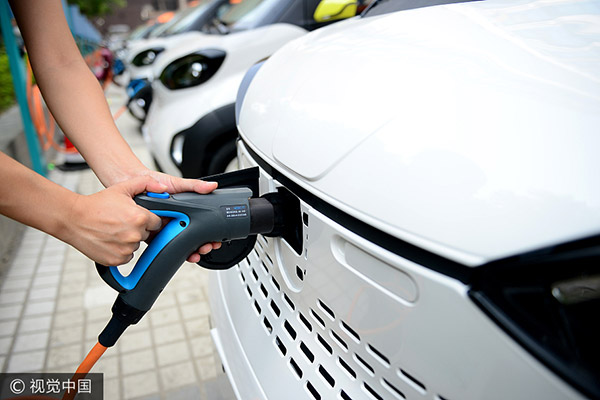
A man charges an electric car at an electric-car rental service bay in Liuzhou, Guangxi province, July 31, 2017. [Photo/VCG]
The development of the renewable energy sector has to push economic growth while dealing with climate change. How to reach a delicate balance between the two poses a challenge to many countries. The long cycle and high costs of renewable energy projects along with the lack of mature technologies have created obstacles to some countries promoting the transition away from fossil fuels to renewable energy sources.
China's booming new and renewable energy sector can to a large extent be attributed to its long-term vision. It incorporated the construction of an ecological civilization as an important part of the 13th Five-Year Plan (2016-20), and it has made continuing efforts to advance along a green, low-carbon and sustainable development path.
According to a report recently published by the International Energy Agency, the world's photovoltaic sector saw a 50 percent capacity increase in 2016, half of which was contributed by China, and more than 40 percent of the newly-increased global power capacity fueled by renewable energy comes from China.
China is now the world's largest renewable energy producer, consumer and investor, and the largest producer and consumer of new energy vehicles.
It also ranks first in terms of the installed scale of hydropower, wind power and solar power generation, and the scale of ongoing nuclear power facility construction.
Green development has brought China tangible economic dividends. According to the International Renewable Energy Agency, the clean energy sector has created for China 3.5 million jobs, and its newly-added investment in the field will reach 2.5 trillion yuan ($376.81 billion) by 2020 and create approximately 10 million jobs.
With its own practices, China has proved to the world that economic development and the control of carbon emissions are compatible.